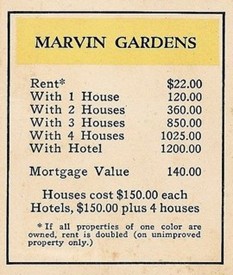 An associate of ours recently told us that John McPhee once stated that he lives in constant fear of being outed as a fraud. Since we share this uniquely writerly anxiety, we’ve been searching high and low for the exact quote in which one of non-fiction’s true masters reveals himself to be a mere mortal. Try as we might, alas, we’ve been unable to locate the confession. But though our hunt has so far failed to achieve its primary goal, it hasn’t been a total waste. The quest compelled us to read McPhee’s “The Search for Marvin Gardens”, his 1972 elegy for Atlantic City. The man’s descriptive prowess is a wonder to behold—few other writers can drag the reader’s eye across an entire urban landscape in a single passage:
An associate of ours recently told us that John McPhee once stated that he lives in constant fear of being outed as a fraud. Since we share this uniquely writerly anxiety, we’ve been searching high and low for the exact quote in which one of non-fiction’s true masters reveals himself to be a mere mortal. Try as we might, alas, we’ve been unable to locate the confession. But though our hunt has so far failed to achieve its primary goal, it hasn’t been a total waste. The quest compelled us to read McPhee’s “The Search for Marvin Gardens”, his 1972 elegy for Atlantic City. The man’s descriptive prowess is a wonder to behold—few other writers can drag the reader’s eye across an entire urban landscape in a single passage:
Mediterranean and Baltic are the principal avenues of the ghetto. Dogs are everywhere. A pack f seven passes me. Block after block, there are three-story brick row houses. Whole segments of them are abandoned, a thousand broken windows. Some parts are intact, occupied. A mattress lies in the street, soaking in a pool of water. Wet stuffing is coming out of the mattress. A postman is having a rye and a beer in the Plantation Bar at nine-fifteen in the morning. I ask him idly if he knows where Marvin Gardens is. He does not. “HOOKED AND NEED HELP? CONTACT N.A.R.C.O.” “REVIVAL GOING ON CONDUCTED BY REVEREND H. HENDERSON OF TEXAS.” These are signboards on Mediterranean and Baltic. The second one is upside down and leans against a boarded-up window of the Faith Temple Church of God in Christ. There is an old peeling poster on a warehouse wall showing a figure in an electric chair. “The Black Panther Manifesto” is the title of the poster, and its message is, or was, that “the fascists have already decided in advance to murder Chairman Bobby Seale in the electric chair.” I pass an old woman who carries a bucket. She wears blue sneakers worn through. Her feet spill out. She wears red socks rolled at the knees. A white handkerchief, spread over her head, is knotted at the corners. Does she know where Marvin Gardens is?
Read the rest here. How we wish that McPhee could have been hired on to write a few episodes of Boardwalk Empire—we feel like he gets A.C. on a super-deep level.


Brian Moore // May 21, 2010 at 6:09 pm
I feel like this would be appropriate to link here:
http://failblog.files.wordpress.com/2010/05/129118838911143550.jpg
That’s a great article though.
growler // May 21, 2010 at 11:31 pm
He’s such a great writer, and I have not even begun to scratch the surface of his work. The title essay in his new book, “Silk Parachute,” is a lovely little slice of words.
For some reason (I guess the New Jersey connection made in my brain) I thought of Robert Sullivan’s “The Meadowland,” which is a pretty great piece of writing itself.
growler // May 21, 2010 at 11:32 pm
(Ooops. “The Meadowlands.” Stupid meat fingers!
scottstev // May 21, 2010 at 11:44 pm
Jane Smiley also used “Monopoly” to great effect in “A Thousand Acres.” The different members of an over-leveraged farm family played with various styles reflecting their character’s ethics.
Brendan I. Koerner // May 22, 2010 at 5:43 pm
Need to read “The Meadowlands” ASAP. Liked Sullivan’s “Rats,” and I hear the NJ book is several times better. Moving to the top of the queue, along with a McPhee my Wired editor rec’d: “The Curve of Binding Energy.”